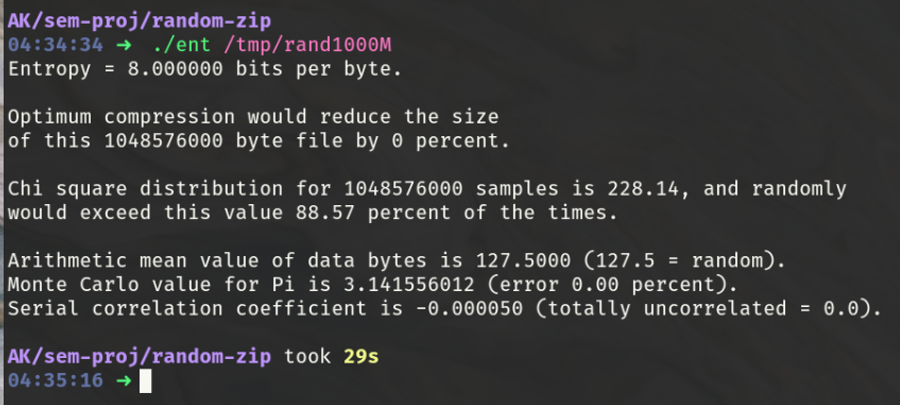5.6 KiB
fortuna
this repo contains the sawce of the Fortuna CSPRNG implementation in C++.
multi-threaded.
adherent to C++20 (best effort).
handles OS signals (SIGINT, SIGTERM, SIGUSR1, SIGUSR2).
the following asciicast shows fortuna provide a 100MiB of pseudo-random data
along with useful debug insights on data retrieval times,
the reseed_ctr,
bytes remaining, and Pool 0 (p0) size:
validation
to ensure a fundamental soundness of the implementation, fortuna output has been statistically analysed using:
-
dieharder- A Random Number Test Suite (v3.31.1) - on a ~243GiB stream of random material that the program kept producing untildieharderfinished testing (log)
command used:➜ fortuna | dieharder -a -g 200 -k 2 -Y 1parameter explanation:
-a: runs all available tests (including some from NIST's STS)-g 200: a special mode to read raw data from standard input (where fortuna outputs its stream)-k 2: speed and precision of sample reading, set to slow and precise:2 is slower still, but (we hope) accurate to machine precision for any number of psamples up to some as yet unknown numerical upper limit (it has been tested out to at least hundreds of thousands).
-Y 1:Xtrategyflag for the "test to failure" mode - set to "resolve ambiguity" (RA)
dieharder warning:
NOTE WELL: The assessment(s) for the rngs may, in fact, be completely incorrect or misleading. There are still "bad tests" in dieharder, although we are working to fix and improve them (and try to document them in the test descriptions visible with -g testnumber -h). In particular, 'Weak' pvalues should occur one test in two hundred, and 'Failed' pvalues should occur one test in a million with the default thresholds - that's what p MEANS. Use them at your Own Risk! Be Warned!
that is, it appears fortuna can withstand this "dieharder battery of tests".
-
ent- A Pseudorandom Number Sequence Test Program - on a sample of 1000MiB of random data
disclaimer
note that this project is a direct continuation of the semestral work originally created for my Applied Cryptography university course, which has since been archived as the course had concluded.
⚠ polite warning: this code is not production-ready and has not been professionally and thoroughly vetted.
be advised that while I do believe the implementation to be correct and valid, I would still recommend AGAINST USING this program to get entropy for any serious purpose, since the code has not undergone proper peer review.
please, be kind. this is my first larger-than-main.cpp C++ effort.
build 🔨
build-time dependencies
- c++ compiler (note: only tested on fedora 35,36 and archlinux with
g++andclang++(versions ~12.2.1 and ~14.0.5, respectively) ninja- CMake
makelibc++(only tested withlibcxx)libclibmcryptopplib{a,l,t,ub}sanon fedora,gcc-libson archlinux{fmt}- this one's also present as a submodule atlib/fmtand automatically used iffmtlibis not already present on the system.ldd- optionalgit- implicitly
pkg-confto look for all the libraries
runtime dependencies
libc++libmcryptopp
make targets
there are multiple targets available in the Makefile that allow for
a relatively straightforward (definitely room for improvement) development
experience without the need to type g++ or (CMake, for that matter)
incantations directly:
make clean- cleans up build objects,ninjaand CMake-generated filesmake build- a synonym for CMake's debug build (alsomake debug)make release- builds a release-optimised binarymake san- builds a binary with sanitizersmake tidy- builds a binary withclang tidychecksmake check- checks code usingcppcheckand runsmake tidymake test- doesn't run actual tests (🙈), instead checks code withmake checkand then builds a debug binarymake distclean- scrapes CMake build files from build directories
the debug/release/san targets each have a clang++ variant available, suffixed
_cl, such that, e.g. make debug_cl would build a debug binary with clang++.
code formatting
see .clang-format
➜ clang-format *.cpp *.h
LICENSE
GPL-3.0-or-later (see LICENSE for details).
